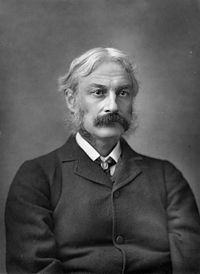(Child, Part III., p. 182.)
Lord Thomas and Fair Annet
Sate a' day on a hill;
Whan night was cum, and sun was sett,
They had not talkt their fill.
Lord Thomas said a word in jest,
Fair Annet took it ill:
“A, I will nevir wed a wife
Against my ain friend's will.”
“Gif ye wull nevir wed a wife,
A wife wull neir wed yee;”
Sae he is hame to tell his mither,
And knelt upon his knee.
“O rede, O rede, mither,” he says,
“A gude rede gie to mee;
O sall I tak the nut-browne bride,
And let Faire Annet bee?”
“The nut-browne bride haes gowd and gear,
Fair Annet she has gat nane;
And the little beauty Fair Annet haes
O it wull soon be gane.”
And he has till his brother gane:
“Now, brother, rede ye mee;
A, sall I marrie the nut-browne bride,
And let Fair Annet bee?”
“The nut-browne bride has oxen, brother,
The nut-browne bride has kye;
I wad hae ye marrie the nut-browne bride,
And cast Fair Annet bye.”
“Her oxen may dye i' the house, billie,
And her kye into the byre;
And I sall hae nothing to mysell
Bot a fat fadge by the fyre.”
And he has till his sister gane:
“Now, sister, rede ye mee;
O sall I marrie the nut-browne bride,
And set Fair Annet free?”
“I'se rede ye tak Fair Annet, Thomas,
And let the browne bride alane;
Lest ye sould sigh, and say, Alace,
What is this we brought hame!”
“No, I will tak my mither's counsel,
And marrie me owt o hand;
And I will tak the nut-browne bride,
Fair Annet may leive the land.”
Up then rose Fair Annet's father,
Twa hours or it wer day,
And he is gane unto the bower
Wherein Fair Annet lay.
“Rise up, rise up, Fair Annet,” he says
“Put on your silken sheene;
Let us gae to St. Marie's Kirke,
And see that rich weddeen.”
“My maides, gae to my dressing-roome,
And dress to me my hair;
Whaireir yee laid a plait before,
See yee lay ten times mair.
“My maids, gae to my dressing-room,
And dress to me my smock;
The one half is o the holland fine,
The other o needle-work.”
The horse Fair Annet rade upon,
He amblit like the wind;
Wi siller he was shod before,
Wi burning gowd behind.
Four and twanty siller bells
Wer a' tyed till his mane,
And yae tift o the norland wind,
They tinkled ane by ane.
Four and twanty gay gude knichts
Rade by Fair Annet's side,
And four and twanty fair ladies,
As gin she had bin a bride.
And whan she cam to Marie's Kirk,
She sat on Marie's stean:
The cleading that Fair Annet had on
It skinkled in their een.
And whan she cam into the kirk,
She shimmerd like the sun;
The belt that was about her waist
Was a' wi pearles bedone.
She sat her by the nut-browne bride,
And her een they wer sae clear,
Lord Thomas he clean forgat the bride,
When Fair Annet drew near.
He had a rose into his hand,
He gae it kisses three,
And reaching by the nut-browne bride,
Laid it on Fair Annet's knee.
Up then spak the nut-browne bride,
She spak wi meikle spite:
“And whair gat ye that rose-water,
That does mak yee sae white?”
“O I did get the rose-water
Whair ye wull neir get nane,
For I did get that very rose-water
Into my mither's wame.”
The bride she drew a long bodkin
Frae out her gay head-gear,
And strake Fair Annet unto the heart,
That word spak nevir mair.
Lord Thomas he saw Fair Annet wex pale,
And marvelit what mote bee;
But when he saw her dear heart's blude,
A' wood-wroth wexed bee.
He drew his dagger that was sae sharp,
That was sae sharp and meet,
And drave it into the nut-browne bride,
That fell deid at his feit.
“Now stay for me, dear Annet,” he sed,
“Now stay, my dear,” he cry'd;
Then strake the dagger untill his heart,
And fell deid by her side.
Lord Thomas was buried without kirk-wa,
Fair Annet within the quiere,
And o the ane thair grew a birk,
The other a bonny briere.
And ay they grew, and ay they threw,
As they wad faine be neare;
And by this ye may ken right weil
They were twa luvers deare.
Lord Thomas And Fair Annet
Andrew Lang
(1)
Poem topics: beauty, child, father, friend, hair, horse, house, night, work, head, white, long, room, clear, clean, sister, sun, wind, rise, stay, Print This Poem , Rhyme Scheme
Submit Spanish Translation
Submit German Translation
Submit French Translation
Write your comment about Lord Thomas And Fair Annet poem by Andrew Lang
Best Poems of Andrew Lang
